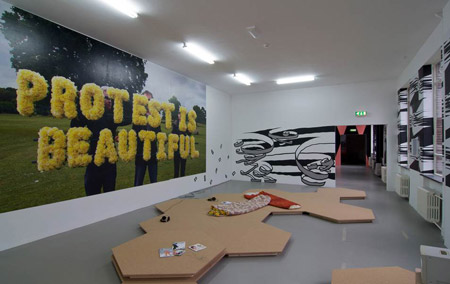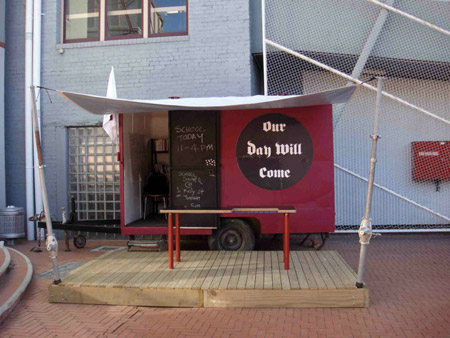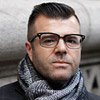|
  World of Art and Igor Zabel Association for Culture and Theory World of Art and Igor Zabel Association for Culture and Theory
Series of public lectures Reflections and shifts in curatorial, critical and artistic practices
Paul O’Neill:
Did Somebody Say Curating, Again?
Recent Turns in Curatorial Practice
Lecture and workshop
Lecture: May 12, 2014 at 7 pm
Workshop: May 13–15, 2014
Project Room SCCA, Metelkova 6, Ljubljana
Workshop application deadline: Friday, May 9, 2014
LECTURE
The Exhibition-as-Medium, the Exhibition-as-Form: Co-productive Exhibition-making and Attentiveness
Monday, May 12, 2014 at 7 pm

Coalesce Happenstance, Curated by Paul O'Neill, SMART, Amsterdam, 2011
The group exhibition-form has become the primary site for curatorial experimentation and, as such, represents a relatively new discursive space around artistic practice. Paul O'Neill will look back at some of his exhibitions, and describe how cumulative and expanding exhibition-forms can constitute an investigation into how the curatorial role is made manifest through cohesive and co-operative exhibition-making structures applied during all stages of the exhibition production. This talk will demonstrate how exhibitions create spatial relations between different planes of interaction for the viewer, and how multiple agencies and actors are necessary for an understanding of the curatorial as a constellation of activities that can be represented by the final exhibition-form.
WORKSHOP
This workshop will look at recent turns in contemporary curatorial practice. In doing so it will explore certain concepts of the discursive, the durational and the educational turns in contemporary curating. Given that the group exhibition has become the primary site and medium for curatorial experimentation it still represents a relatively new discursive space around artistic and curatorial practice.
This workshop will explore how different group exhibition-forms have investigated how the curatorial is made manifest, through cohesive and co-operative exhibition-making structures applied through close involvement of all those involved, where multiple actors and agencies are at work during different stages of exhibition production. It will begin by exploring how exhibitions create certain social and spatial relations for the viewer, and how the an understanding of the exhibition-as-medium, and the exhibition-as-form, and their different durational dimensions are being contested.
This workshop will continue to address the on-going "discursive turn" in contemporary curating to the more recent "educational turn" in a way that seeks a critical reconstruction of "the exhibition" and "the school" in curating and discursive practices. Key terms to be explored will be the curatorial, collaboration, duration, participation, ritual, citizenship, sociality, relationality, publicness, attentiveness, and the discursive.
Taking the two questions: ‘What is an Exhibition?’ and ‘What is a School?’ as the starting point, this workshop will aim to produce a collaborative Dictionary of Terms/Curatorial Dictionary produced by the participants that look at key concerns and interpretations of issues, concerns, questions and understanding stemming from their own practice and seeking common points of reference to draw upon and to use as a means of articulating their current aims and objectives within their practice.

Our Day Will Come, Month-long Free School Project, Curated by Paul O'Neill and Fiona Lee, Hobart, Tazmania, 2011
SCHEDULE
DAY ONE
Tuesday, May 13, 2014
10.00–11.45:
Introduction of group and format for the 3-day workshop. Followed by Paul’s lecture on his practice introducing some key terms for discussion.
11.45–12.00:
Coffee Break
12.00–13.30:
Response to Paul’s Lecture and to the set Workshop Readings.
13.30–15.00:
Lunch Break
15. 00–18.00:
Practical Part: Breakaway Sessions – small groups to come up with list of terms that they wish to focus on and relate to their own practice.
DAY TWO
Wednesday, May 14, 2014
Day two will start with two questions: What was an Exhibition? What was a School? and continue to address the "discursive turn", the "educational turn" in a way that seeks a critical reconstruction of "the exhibition" and "the school" in curating and discursive practices.
10.00–11.30:
Presentation: "The critique of exhibition and of school in curating and the educational turn"
This presentation will give a brief historical overview of some of the key developments in the examination of the changing concepts of exhibition and the school as critiqued in recent curatorial debate and practice. Some of the key issues will be orientated around concepts of participation, ritual, citizenship, sociality, relationality, and the discursive. Three short Case Studies will be included: "unitednationsplaza", "The Blue House" and "A.C.A.D.E.M.Y". The presentation will be followed by discussion.
11.30–11.45:
Coffee break
11.45–13.15:
This session will invite participants to work in groups of 3 to 4 addressing an initial set of questions: (i) How are these projects framed with respect to the question of exhibition and school? (ii) How do these projects differ? (iii) What do these projects hold in common? (iv) What is the significance of location for each project? (v) What kind of publics are being constituted by these projects? However, the workgroups will be encouraged to replace these questions with another agenda, if these questions do not match their interests.
13.15–14.45:
Discussion: "The experience of exhibition. The experience of school."
Based on the three Readings in the group, participants are asked to bring up points of discussion. Each participant will be asked to talk about their experience of exhibition viewership and their experience of schooling, and how their experience was structured, organized, displayed. Particular attention will be focused on the question of self-discipline and the experience of norms of behavior and how these are encountered in the situation of schooling and the situation of exhibition. The broad goal of this discussion will be to identify the how exhibition and schooling are similar and are different in terms of the shaping of our behaviors and our subjectivities.
STEMMING FROM THIS DISCUSSION, Feedback, Review, Continue Dictionary of Terms and plan for Day three.
How does the prescription of a structure to the day shape and limit the dialogues produced?
How do authority, ritual and discipline function in this situation?
Does it matter that "we" have this conversation in "this place" and not another place today?
What should "we" do tomorrow?
DAY THREE
Thursday, May 15, 2014
Day three will open up two questions: What can an exhibition become? What can a school become?
15.00–16.30: Presentations by participants on issues of relevance for them drawing upon issues, concerns and current questions they wish to unpack as part of the group.
16.30–16.45:
Coffee break
16.45–18.30:
Based on what was discussed in the first two days, participants are asked to HIGHLIGHT one term each from their groups which they have been thinking about as a means of coming up with a group list of terms as part of a Curatorial Dictionary.
Followed by: INFORMAL REVIEW: Drinks and Feedback Session
How should this workshop be done if it is ever done again?
APPLICATION
Workshop application deadline: Friday, May 9, 2014
The participants are asked to prepare for the workshop by reading the workshop material beforehand (will be sent to participants by organizers on Saturday, May 10, 2014).
The schedule of the workshop is flexible and will be adjusted to the work process if needed therefore we reserve the right to change the schedule.
The workshop costs 10 EUR. The number of participants is limited to 10. Due to a large number of applicants a selection will be made by organizers and a preference will be given to those who can attend the workshop in its entirety. The participation fee must be paid before the start of the workshop and is non-refundable.
Please send your application with CV in English to:
svetumetnosti@scca-ljubljana.si
 |
 Dr. Paul O'Neill is a curator, artist, writer and educator based in New York and Bristol. He is a Director of the Graduate Program at the Centre for Curatorial Studies, Bard College in New York. O'Neill has co-curated more than 50 exhibition projects across the world including: The Curatorial Timeshare, Enclave, London (2013); Our Day Will Come, Part of Iteration: Again, Hobart, Tasmania (2011); We are Grammar, Pratt Institute, Manhattan Gallery, New York (2011); Coalesce: happenstance, SMART, Amsterdam (2009); Making Do, The Lab, Dublin (2007); General Idea: Selected Retrospective, Project Art Center, Dublin (2006); Tonight, Studio Voltaire, London, (2004); Are We There Yet? Glassbox, Paris (2000) and Passports, Zacheta Gallery of Contemporary Art, Warsaw (1998). He is an international tutor on the de Appel Curatorial Program since 2005, Amsterdam and he has held numerous research and lecturing positions at Goldsmiths, University of London; Middlesex University; The Graduate School of Creative Arts and Media, Dublin and the University of the West of England, Bristol. Between 2001–03, he was the Gallery Curator-Director of London Print Studio Gallery, where he curated group shows such as Private Views; Frictions; A Timely Place...Or Getting Back to Somewhere; All That is Solid and solo projects: Albers; Being Childish Billy Childish; Phil Collins Reproduction Timewasted; Harrowed: Faisal Abdu’ Allah and Locating: Corban Walker. He was Artistic Director of Multiples X from 1997–06; an organisation that commissioned and supported curated exhibitions of artist’s editions, which he established in 1997 and included exhibitions at spaces such as the ICA, London; Temple Bar Gallery, Dublin; Ormeau Baths, Belfast; Glassbox, Paris and The Lowry, Manchester. Dr. Paul O'Neill is a curator, artist, writer and educator based in New York and Bristol. He is a Director of the Graduate Program at the Centre for Curatorial Studies, Bard College in New York. O'Neill has co-curated more than 50 exhibition projects across the world including: The Curatorial Timeshare, Enclave, London (2013); Our Day Will Come, Part of Iteration: Again, Hobart, Tasmania (2011); We are Grammar, Pratt Institute, Manhattan Gallery, New York (2011); Coalesce: happenstance, SMART, Amsterdam (2009); Making Do, The Lab, Dublin (2007); General Idea: Selected Retrospective, Project Art Center, Dublin (2006); Tonight, Studio Voltaire, London, (2004); Are We There Yet? Glassbox, Paris (2000) and Passports, Zacheta Gallery of Contemporary Art, Warsaw (1998). He is an international tutor on the de Appel Curatorial Program since 2005, Amsterdam and he has held numerous research and lecturing positions at Goldsmiths, University of London; Middlesex University; The Graduate School of Creative Arts and Media, Dublin and the University of the West of England, Bristol. Between 2001–03, he was the Gallery Curator-Director of London Print Studio Gallery, where he curated group shows such as Private Views; Frictions; A Timely Place...Or Getting Back to Somewhere; All That is Solid and solo projects: Albers; Being Childish Billy Childish; Phil Collins Reproduction Timewasted; Harrowed: Faisal Abdu’ Allah and Locating: Corban Walker. He was Artistic Director of Multiples X from 1997–06; an organisation that commissioned and supported curated exhibitions of artist’s editions, which he established in 1997 and included exhibitions at spaces such as the ICA, London; Temple Bar Gallery, Dublin; Ormeau Baths, Belfast; Glassbox, Paris and The Lowry, Manchester.
O'Neill’s writing has been published in many books, catalogues, journals and magazines and he is a regular contributor to Art Monthly. He is reviews editor for Art and the Public Sphere Journal and is an editor of Afterall’s Exhibition Histories Series. He is on the editorial board of The Exhibitionist and The Journal of Curatorial Studies. He is the editor of the curatorial anthology, Curating Subjects (2007), and co-editor of Curating and the Educational Turn with Mick Wilson (2010), both published by de Appel and Open Editions (Amsterdam and London), and the author of Locating the Producers: Durational Approaches to Public Art (Amsterdam, Valiz, 2011), edited with Claire Doherty. He is the author of the critically acclaimed book The Culture of Curating and the Curating of Culture(s), (Cambridge, MASS., The MIT Press, 2012). His forthcoming book Curating Research (de Appel and Open Editions) co-edited with Mick Wilson will be published in 2014.
 |
The lecture and the workshop is a part of the 2014 World of Art public programme, which is being prepared by the SCCA–Ljubljana and the Igor Zabel Association for Culture and Theory.
The programme is supported by: the City of Ljubljana – Department for Culture; ERSTE Foundation; the United States Embassy in Ljubljana.
  
More: www.igorzabel.org
[Published April 25, 2014]
|

